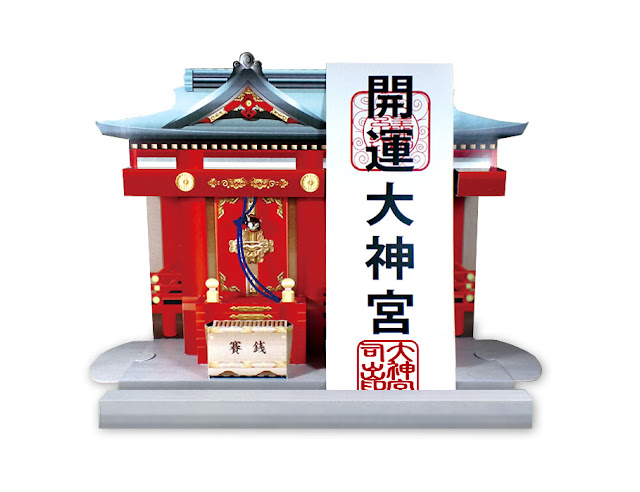Portable Kamidana Jinja
An Inexpensive Fold-out Shinto Altar for Home or Away
 | |
| The Portable Kamidana Jinja with a sample ofuda. The pictured ofuda is only a representation. An actual ofuda can only be purchased from a Shinto shrine. |
Originally posted on 6/19/19
Most readers of this blog know that a kamidana or "God Shelf" is a small, Shinto altar for the home, office, or place of work.
Usually made of wood and attached to a wall near the ceiling it was
once ubiquitous in Japan. However, these days, when most people live in
apartments, where attaching anything to the wall is restricted, move
frequently, or live away from home for long periods of time due to work
requirements, the kamidana has all but disappeared. Still, many people frequent the local shrine, particularly at New Year's, and purchase ofuda
for the home, then have no place to properly keep them. For people in
these situations, as well as for foreign visitors with a keen interest
in Shinto, the Portable Kamidana Jinja is an excellent solution. Please keep in mind that the kamidana is only a home alter and does not refer to any specific kami or jinja. In other words, it is not imbued with any spiritual power. Only an ofuda from a jinja can represent the spirit of any specific kami. The one pictured above is only a sample, not an actual ofuda.
Simply follow the easy instructions to unfold the kamidana, and set it up in on a shelf or cabinet. No tape or glue needed. Then place your ofuda in the position provided. Now you are set to offer a silent prayer to the kami and receive it's blessings. If you would like to send the Portable Kamidana Jinja as a gift, it slips conveniently into an A4 size envelope. You can also collapse the Kamidana and reset it any number of times. The Portable Kamidana Jinja costs 2,700 yen including 200 yen tax. (Shipping and paypal fee adds 450 yen for a total of 3,150 ). For further information or orders, contact me at hitsugi101@yahoo.com.
The Portable Kamidana makes an excellent gift as well. Made of heavy weight paper and beautifully printed, it presents a formal appearance appropriate to the task of supporting the ofuda. Once again, please keep in mind that the sample provided with the kamidana, is not an actual ofuda, and should not be displayed. Also note that some ofuda may be very long and not easily supported. The sample ofuda depicted here is 190mm tall but up to 250mm is fine. You can pay through paypal internationally or furikomi within Japan.
Simply follow the easy instructions to unfold the kamidana, and set it up in on a shelf or cabinet. No tape or glue needed. Then place your ofuda in the position provided. Now you are set to offer a silent prayer to the kami and receive it's blessings. If you would like to send the Portable Kamidana Jinja as a gift, it slips conveniently into an A4 size envelope. You can also collapse the Kamidana and reset it any number of times. The Portable Kamidana Jinja costs 2,700 yen including 200 yen tax. (Shipping and paypal fee adds 450 yen for a total of 3,150 ). For further information or orders, contact me at hitsugi101@yahoo.com.
The Portable Kamidana makes an excellent gift as well. Made of heavy weight paper and beautifully printed, it presents a formal appearance appropriate to the task of supporting the ofuda. Once again, please keep in mind that the sample provided with the kamidana, is not an actual ofuda, and should not be displayed. Also note that some ofuda may be very long and not easily supported. The sample ofuda depicted here is 190mm tall but up to 250mm is fine. You can pay through paypal internationally or furikomi within Japan.
 |
| Instructions for setting up the Kamidana Jinja |
 |
| The kamidana with two Goshuinchou |
 |
| The Kamidana Jinja with the saisenbako and suzu in place. |

